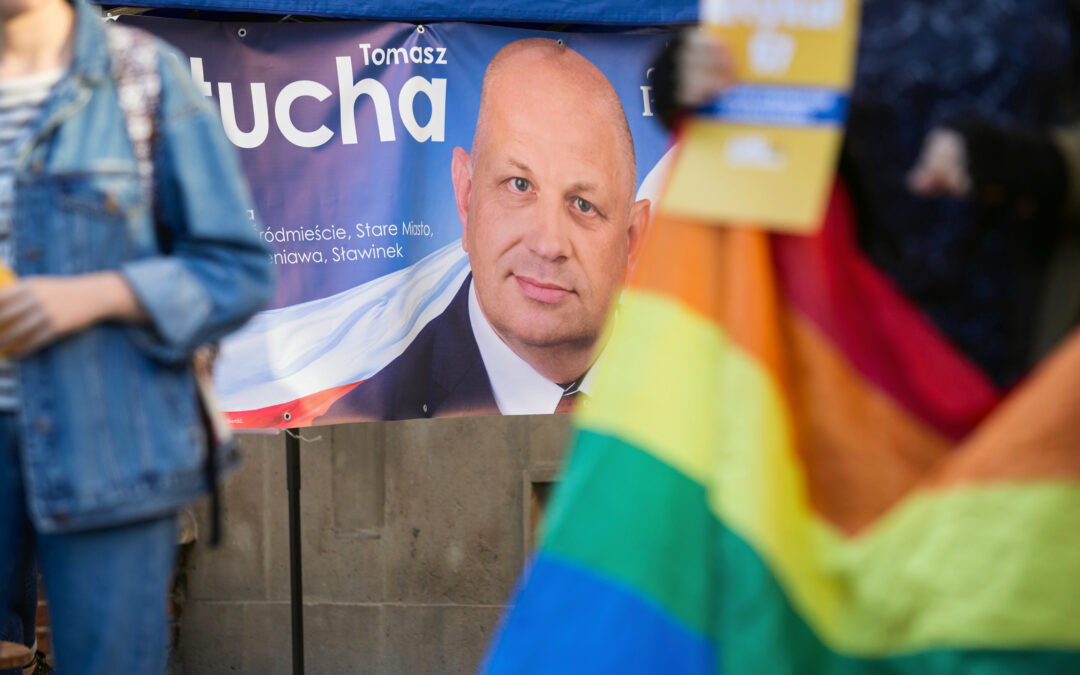A politician from Poland’s conservative ruling party has been forced to make a donation to his home city’s LGBT parade after being sued for accusing it of promoting paedophilia. He had refused to respect the court order, but the money has now been seized from his bank account.
Three years ago, Tomasz Pitucha of the Law and Justice (PiS) party complained on Facebook about the fact that the parade was being organised in Lublin, where he is a member of the city council, for the first time. The event “promotes homosexuality and paedophilia”, he wrote.
Pitucha was at the time an advisor to Przemysław Czarnek, then the governor of Lublin Province and now education minister. Czarnek is a leading figure in the ruling party’s campaign against what it calls “LGBT ideology”, which the minister says “comes from the same roots as German Nazism”.
Earlier this year, Pitucha was, on the recommendation of Czarnek, appointed as deputy director of the Education Development Centre, a national teacher-training institution.
In response to Pitucha’s post, one of the organisers of the LGBT parade, Bartosz Staszewski, sued him. In 2019, Pitucha was convicted of defamation, with the judge finding that the aim of the march was to “promote equality and tolerance” and that linking it to paedophilia was “untrue and harmful”.
Pitucha appealed against the ruling, saying that it “shows we still have to do a lot in the social space for the aggressive policy of homosexual groups to be treated properly”. However, his appeal was rejected, and Pitucha was ordered to pay 5,000 zloty (€1,090) to the organisers of the parade.
“I do not change my opinion as to the harmfulness of the marches…especially for young people,” said Pitucha after the appeals court had ruled. “Perhaps one has to lose many trials to stop this evil that is happening through the promotion of homosexuality in Poland.”
Yet, while Pitucha also said that he “accept this judgement with humility”, he subsequently refused to pay the fine. “I can’t donate money to the [LGBT] march because it is against my beliefs,” he told Onet. Meanwhile, the politician’s supporters organised an online fundraiser that raised 6,207 zloty to cover his costs.
This week, the organisers of the parade announced that bailiffs had seized the money from Pitucha’s bank account and transferred it to them. “We will spend it on the organisation of the march and therapeutic assistance for LGBT people,” they wrote.
This year’s parade – the third to be held in Lublin – will take place on 23 October. The first, in 2018, ended in violence after it was attacked by nationalist protesters.
The second, in 2019, went ahead after a court overturned an attempt to ban it by the city’s mayor, Krzysztof Żuk of Civic Platform (PO). Last year’s event was cancelled due to the pandemic.
Police have clashed with nationalist protesters during Lublin's first ever #LGBT march #MarszRowności. Water canon and stun grenades were used, reports @wirtualnapolska. The mayor tried to ban the march because of potential violence from counter-protesters pic.twitter.com/M7FMCvHDAc
— Notes from Poland 🇵🇱 (@notesfrompoland) October 13, 2018
During his time as governor of Lublin Province, Czarnek awarded medals to those involved in the fight against “LGBT ideology”. He also spoke on stage at a march organised by the National Radical Camp (ONR), an ultranationalist group that seeks to create an “ethnically homogeneous” Poland.
Since becoming education minister in 2019, Czarnek has condemned LGBT pride parades for “promoting deviancy” and said that those who do so “do not have the same rights” as “normal people”.
Hundreds of academics in Poland and abroad have protested against Czarnek’s appointment, accusing him of “homophobic, xenophobic and misogynistic views”.
In August, the minister met with members of the LGBT+ Youth Forum for what he said was a “substantive and calm discussion”. The activists welcome the meeting as “a step forward”.
Main image credit: Jakub Orzechowski / Agencja Gazeta

Daniel Tilles is editor-in-chief of Notes from Poland. He has written on Polish affairs for a wide range of publications, including Foreign Policy, POLITICO Europe, EUobserver and Dziennik Gazeta Prawna.




















